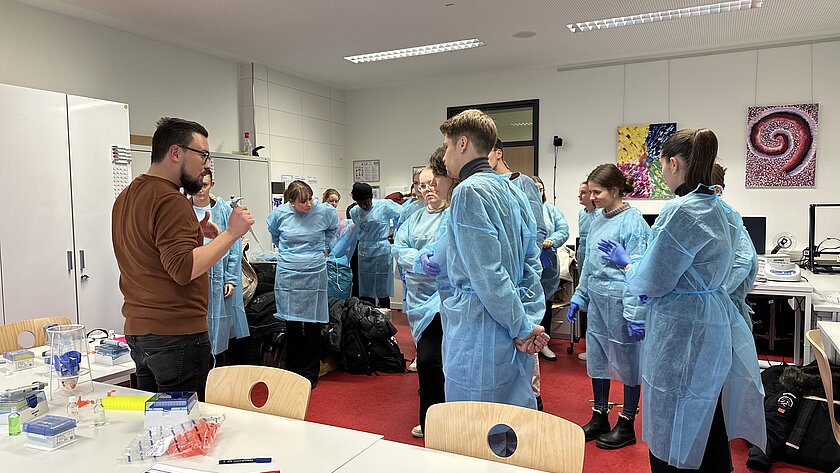DNA isolation, amplification and agarose gel electrophoresis - for the first semester students on the Physician Assistant course, these terms are no longer foreign words: the "Genetics" laboratory course, which took place for the second time this semester, makes the participants fit in basic laboratory techniques, including methods for splitting and sorting DNA or RNA strands.
PCR: behind the scenes of a technology with a future
A highlight of the course: the polymerase chain reaction (PCR), a technique that can be used to quickly amplify selected DNA sections. The term has been on everyone's lips since the coronavirus pandemic - the Physician Assistant students were now able to take a look behind the scenes of this process using a thermal cycler. What initially appears to be a relatively unspectacular heating block is a device that can achieve large temperature differences in a very short time. This makes PCR "virtually child's play", as Daniel Eitel, Laboratory Manager at the DigiHealth Institute, explains. "PCR is a technology that has become an integral part of everyday life and will have a lasting impact on our future - that's why it's important for us to introduce it to students."
Three steps to amplified DNA
He tested the three steps of PCR with the students in smaller groups: "First, we made an existing, double-stranded DNA molecule single-stranded at 100 degrees Celsius. In the second step, the so-called primers are attached at 45 degrees Celsius. These represent a short piece of DNA that binds to the respective target region on the two single strands - this can be a gene, for example. In the third step, the pair of single strand and primer is completed using an enzyme, the polymerase, at around 70 degrees Celsius. In this way, we have ultimately created two DNA molecules from one." The process corresponds to one cycle, of which around 70 are usually carried out per experiment, with exponential amplification.
Experiential molecular biology: students can analyze samples themselves
After this experience, the course participants were allowed to carry out this process themselves in a very practical way: Based on the horsemeat scandal in Europe in 2013, they were given the task of identifying a meat sample that was unknown to them. One group was assigned a beef sample and another a horsemeat sample. After successful PCR and electrophoresis, the samples were analyzed under UV light. The previously amplified DNA was colored with a fluorescent dye so that the students could see so-called bands glowing. Depending on the height of the band, this then spoke in favor of either cattle or horse in comparison with the positive control.
The bentolab of the GM-Lab (HNU's Health Management Laboratory) was used; a small unit consisting of a centrifuge, UV chamber, electrophoresis chamber and thermal cycler, which is just the size of a printer and can be used anywhere.
Contact person
Prof. Dr. Walter Swoboda
Daniel Eitel







